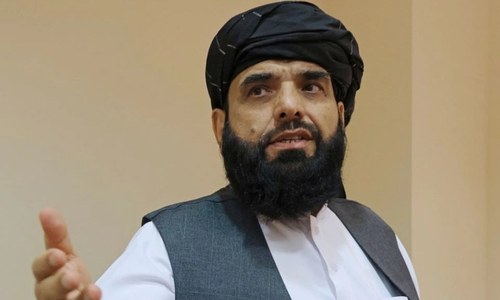MES AYNAK: The ancient Buddha statues sit in serene meditation in the caves carved into the russet cliffs of rural Afghanistan. Hundreds of meters below lies what is believed to be the world’s largest deposit of copper.
Afghanistan’s Taliban rulers are pinning their hopes on Beijing to turn that rich vein into revenue to salvage the cash-starved country amid crippling international sanctions.
The fighters standing guard by the rocky hillside may once have considered destroying the terracotta Buddhas. Two decades ago when the hardline Taliban were first in power, they sparked world outrage by blowing up gigantic Buddha statues in another part of the country, calling them pagan symbols that must be purged.
Read: China says willing to extend CPEC to Afghanistan
But now they are intent on preserving the relics of the Mes Aynak copper mine. Doing so is key to unlocking billions in Chinese investment, said Hakumullah Mubariz, the Taliban head of security at the site, peering into the remnants of a monastery built by first-century Buddhist monks. “Protecting them is very important to us and the Chinese,” he said.
Mes Aynak valley believed to have the world’s largest deposit of copper
Previously, Mubariz commanded a Taliban combat unit in the surrounding mountains battling with US-backed Afghan forces. When those troops capitulated last year, his men rushed to secure the site. “We knew it would be important for the country,” he said.
The Taliban’s spectacular reversal illustrates the powerful allure of Afghanistan’s untapped mining sector. Successive authorities have seen the country’s mineral riches, estimated to be worth $1 trillion, as the key to a prosperous future, but none have been able to develop them amid the continual war and violence. Now, multiple countries, including Iran, Russia and Turkey are looking to invest, filling the vacuum left in the wake of the chaotic US withdrawal.
But Beijing is the most assertive. At Mes Aynak, it could become the first major power to take on a large-scale project in Taliban-controlled Afghanistan, potentially redrawing Asia's geopolitical map.
Top priority
In 2008, the administration of Hamid Karzai signed a 30-year contract with a Chinese joint venture called MCC to extract high-grade copper from Mes Aynak. Studies show the site holds up to 12 million tonnes of the mineral.
But the project got tied up in logistical and contract problems, and it never got past some initial test shafts before it ground to a halt when Chinese staff left in 2014 because of continued violence.
Mere months after the Taliban seized Kabul in August, consolidating power over the country, the group’s newly installed acting Minister for Mining and Petroleum Shahbuddin Dilawar urged his staff to re-engage Chinese state-run companies.
Ziad Rashidi, the ministry’s director of foreign relations, approached the consortium made up by MCC, China Metallurgical Group Corporation and Jiangxi Copper Ltd. Dilawar has had two virtual meetings with MCC in the last six months, according to company and ministry officials. He urged them to return to the mine, terms unchanged from the 2008 contract.
A technical committee from MCC is due in Kabul in the coming weeks to address the remaining obstacles. Relocating the artifacts is key. But MCC is also seeking to renegotiate terms, particularly to reduce taxes and slash the 19.5 per cent royalty rate by nearly half, the percentage owed to the government per tonne of copper sold.
Chinese companies see the current situation as ideal for them. There is a lack of international competitors and a lot of support from the government side, Rashidi said.
China’s ambassador to Afghanistan has said talks are ongoing, but nothing more.
Acquiring rare minerals is key for Beijing to maintain its standing as a global manufacturing powerhouse. While stopping short of recognising the Taliban government, China has stood out from the international community by calling for the unfreezing of Afghan assets and has kept its diplomatic mission running in Kabul.
For Afghanistan, the contract at Mes Aynak could bring in $250-300 million per year to state revenues, a 17pc increase, as well as $800m in fees over the contracts length, according to government and company officials. That’s a significant sum as the country grapples with widespread poverty, exacerbated by financial shortfalls after the Biden administration froze Afghan assets and international organisations halted donor funds. Some has since resumed.
At Mes Aynak, a 2,000-year-old Buddhist city sits uncomfortably alongside a potential economic engine. Afghanistan’s tumultuous modern history has gotten in the way of both exploring the archaeology and developing the mines.
Published in Dawn, March 28th, 2022














































